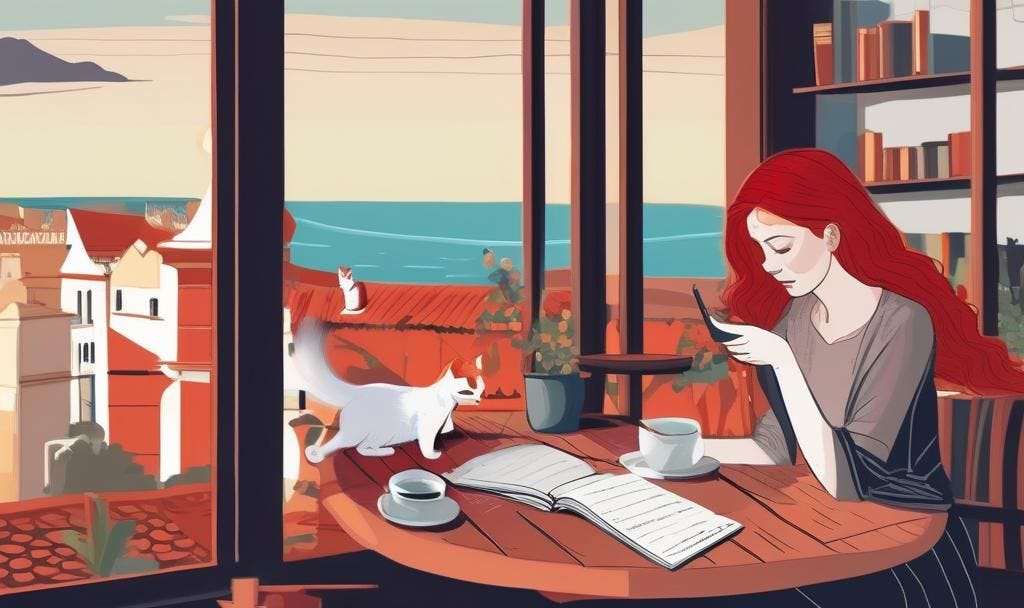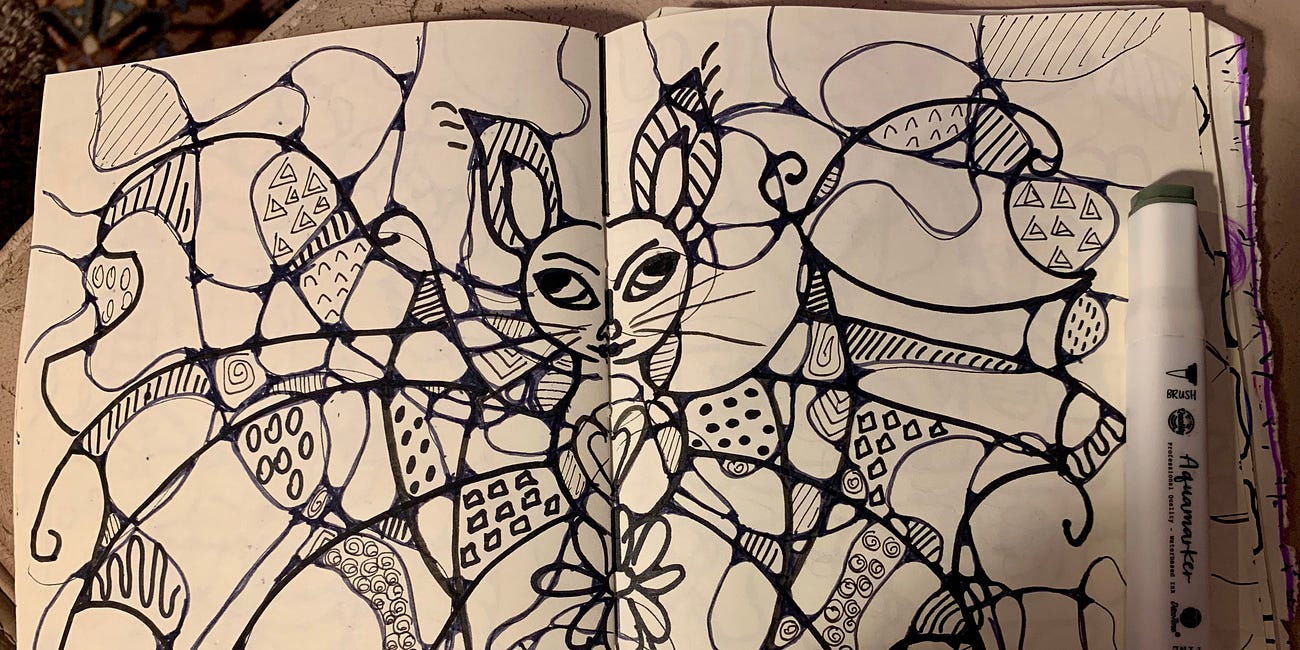Naked truth - When the muse decides - about writing and Tolstoy chapter 18
When writing is part of your life
"Write only if you cannot live without writing. Write only what you alone can write." — Leo Tolstoy
The other day, a friend asked Martha, What does writing mean to you? The question made her pause and reflect.
WRITING – WHY AND HOW DOES IT FEEL
Martha whispered, “Writing, for me, is like breathing—essential and ever-evolving, shifting to serve different needs at different times. Sometimes, it’s a scream into the void, heard only by the blank page. Other times, it’s black tears of frustration mingling with hysterical laughter, as humor reveals itself in the simplest, most unexpected places, helping me process unbearable abuse.
Writing is staring at a wall, yearning to express something but not knowing where to begin. It feels like an unstoppable herd of bison charging across the American prairie, funneled into a narrow mountain pass—only to freeze, paralyzed by the overwhelming presence of other creatures eyeing the same path.
It’s raw, like an open wound, searing with unstructured emotions and fevered intensity. Writing is longing for what could have been and never was. In its purest form, writing at times is about blurting it all out—messy, unrefined, and unfiltered. There’s a strange liberation in that, in letting go of perfection and simply allowing the words to flow.”
WRITING ABOUT YOUR REAL LIFE
Starting to write about various events in her life has helped Martha reclaim fragments of history, unravel memories she had completely forgotten, and give a voice to the many versions of herself at different ages. It helps her process difficult situations while bringing to light habits and lessons that are incredibly useful today. Sometimes a few paragraphs are all she needs to write; other times, the words keep coming like a river.
But writing doesn’t always have to be grand or voluminous. If you, dear reader, think you need to fill pages upon pages to make it meaningful, pause and rethink. When emotional exhaustion weighs heavy, even a single word on the page can be a profound victory—a small but significant act of self-expression and soul-care.
THE ARTIST’S WAY
A few days ago, she picked up The Artist’s Way by Julia Cameron from her bulging shelves of books. It’s a fantastic book, one she thoroughly enjoyed for its self-assured tone and clear, actionable guidance. The premise was simple: follow these steps, stay consistent, and you’ll see results. But there was also a stern caveat—if you’re not consistent, the magic won’t happen.
And here lies her challenge. While the structure and rules are helpful, they can also feel rigid, even stifling. In her case, they led to her giving up again and again, feeling like a failure and, at times, a fraud. What if, instead of insisting on one strict path, the approach allowed for some flexibility?
What if readers were encouraged to experiment with different methods and adapt them to fit their own lives? Finding one’s unique rhythm often leads to lasting habits because it’s aligned with individual realities.
Why, then, ask people to conform to a straitjacket of rules, when freedom to adapt might spark even greater creativity and commitment?
As Martha sipped her coffee, she wondered if adhering to a strict writing routine might improve how her biographical novel took shape. One thing she knew for certain was that writing three pages every morning would be impossible for her. The muse, after all, had her own unpredictable schedule. Sometimes she refused to speak in the morning, only to demand attention in the middle of the night or whisper her ideas late in the evening.
Martha couldn’t shake the feeling that such rigidity might do more harm than good. Forcing herself to write at a set time could invite a sense of anxiety, especially when the blank pages sat there, empty and reproachful, in the early hours of the day. The Artist’s Way was definitely helpful, but it can also feel stifling.
"The task of the writer is to create a new world, to build up a world from his own ideas, and to make it better and more human, a world of truth and justice." — Leo Tolstoy
JANE AUSTEN AND LEO TOLSTOY
For Martha, reading was one of life’s greatest gifts. At times, she can vividly recall exactly where she was when she read a particular book—she can almost smell the scents in the air, see what was around her, and remember what she was eating. These memories are uniquely tied to specific books, with nothing else surrounding them. The books provided a sacred, safe space—the kind that later gurus would recommend people create for themselves in order to feel secure. She could feel the power of books, the potency of the written word, and the energy of the writers wielding their magical pens.
So many times, she found herself imagining where the writers were when they created their work. What was around them? What were their routines, if they had any? The habits of Jane Austen and Leo Tolstoy often came to her mind, especially because she could connect with both their environments and their creative practices on a deep level.
Martha likes to write while in the living room with music playing on her phone or while listening to various Russian documentaries. A smile appeared on her face as she remembered reading that Jane Austen loved to write while in the sitting room surrounded by lots of noise and people. Well, noise never bothered Martha, and writing while on the train or in a café is another way the muse is active in her mind.
Yasnaya Polyana
Years ago, when she visited Yasnaya Polyana, the serene memorial house and farm that once belonged to Lev Tolstoy, she was drawn into the rhythms of his daily life. The story goes that he cherished the quiet stillness of the early morning. By 5 a.m., he was already at his writing table, the soft light of dawn filtering through the windows as he read, wrote in his journal, or worked on the plots for his latest novel. The countryside was a refuge for him, and he would often wander through the fields, dressed in the simple clothes the peasants were dressed in including the traditional long shirt, the the cool morning air carrying the scent of fresh earth and rain Many times, he joined the mujiki as they cut the wheat, taking pleasure in the genuine physical effort, their rhythmic movements in harmony with nature itself.
Levin, one of the characters in Martha’s beloved book Anna Karenina, comes to her mind. Through Levin, we learn a lot about Leo Tolstoy’s country life, as Levin is a reflection of Tolstoy himself. At midday, the simple, wholesome meals brought by the mujiki’s wives, pierogi, kotleti, rye bread, cheese, cold water, tea—humble yet nourishing—were shared in quiet camaraderie, a moment of peace amidst the work.
If there were a place where Martha believed she would truly feel at home and that she belonged, it would be one of those houses surrounded by forests and fields, like the ones she saw at Yasnaya Polyana. And no, don’t imagine it as a huge mansion. This place exudes peace, simplicity, and authenticity—qualities so profound, they are almost impossible to fully imagine.
End of chapter 17
Until next time, be well!
If you find value here, please consider supporting my work by becoming a paid subscriber or you can Buy me a coffee . Also please share with other like minded people.
Finding Solace in Creativity: A 100-Day Journey of Art and Self-Expression
I don’t know about you, but whenever life hurls another challenge my way, I’m irresistibly drawn to pick up a notebook, a thick black Sharpie, or a finer pen and pour everything out through ink and lines. It’s like releasing whatever words or emotions are bottled up inside, one stroke at a time.
Naked truth - chapter 10 kindergarten and ballet in communist Romania
A well-known Romanian saying goes, "It takes a village to raise a child”. Under the Communist regime, life was centred around work, with some options for parents needing help with childcare. Provisions were made for children through weekly or daily kindergartens for families without relatives to help while both parents…






